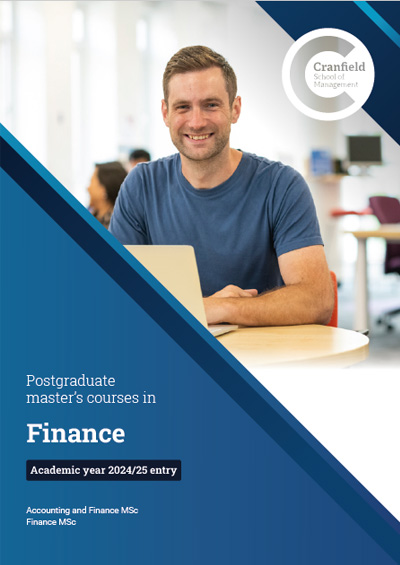The course provides you with a solid grounding in finance and investment and offers extensive training in the relevant tools and techniques and how to apply them practically in the global finance workplace.
Overview
- Start date30 September 2024
- Duration1 year
- DeliveryTaught modules 60%, Dissertation 40%
- QualificationMSc
- Study typeFull-time
- CampusCranfield campus
Who is it for?
- Graduates with a desire to develop their knowledge and skills in finance and investment before seeking their first professional role.
- Professionals with work experience in finance or investment who are seeking to take their career to the next level.
- Individuals who want to be taught by faculty who have experience of business and industry and can bring their knowledge to the programme.
Rankings
This course is recognised in International Business Rankings, consistently ranking top 10 in the UK and top 50 in the world across them all. These include:
- 10th in the UK and 48th in the world: Financial Times Masters in Finance Pre-experience ranking 2023
- 2nd in the UK and 6th in the world: The Times Higher Education/Wall Street Journal World University Rankings 2019 – Master’s in Finance
- 9th in the UK and 52nd in the world: QS World University Rankings: Masters in Finance ranking 2024
Class profile 2022/23*
| Gender: |
Male 66% - Female 34% |
| Age range: |
20 - 39 years |
| Average age: |
24 |
| Number of nationalities: | 13 |
| Nationality: | UK/EU: 1% - International: 99% |
| Total number of students: | 90 |
| Average class size: | 24 |
*The above data combines the 2022/23 class profiles for our Finance MSc (previously Finance and Management MSc) and Accounting and Finance MSc (previously Investment Management MSc).
Why this course?
- Cranfield School of Management consistently performs well in international business rankings. We are ranked 8th in the UK and 37th in Europe in the Financial Times European Business School 2023 Rankings.
- The course is distinctive in covering the principles, tools and techniques of both finance and investment, as well as how to apply them in real work situations.
- You will gain an in-depth understanding of finance and investment, economics, international financial markets and ethics, statistical analysis, financial modelling and investment and portfolio management.
- You will apply financial and investment management theories, tools and techniques in a variety of contexts including case studies, trading simulations and the individual thesis project.
- Modules focus on real-world challenges, and include a combination of case studies, participative exercises, interactive lectures, and group projects.
- You may also have the opportunity to take part in activities, including the CFA Institute UK Research Challenge.
- You will be taught by faculty with experience of the real world of finance and business, as well as having the opportunity to listen to guest speakers.
- You will have access to highly effective infrastructure including Bloomberg live financial data via our Bloomberg Suite.
- You will have the opportunity to study within a truly international environment, with students and academics coming from over 50 countries.
I have been able to apply the skills and knowledge I learnt on the course in my current role. Prior to undertaking the course I wasn’t confident with financial concepts, but since completing the course I feel much more adept at solving problems, and understanding the basic and more complex situations I encounter at work.
Cranfield offers a unique mix of lecturers. We had theoretical courses with outstanding academic faculty, but also practical courses like financial markets taught by practitioners that gave us the perfect mixture of perspectives on a specific topic.
I was offered a full-time job at the company where I can explore my financial and quantitative knowledge in depth. The course really gave me the confidence by providing me with all the knowledge that I needed to push me forward.
Informed by Industry
An external advisory panel informs the design and development of the course, and comprises senior finance practitioners, reinforcing its relevance to the modern financial world. Our faculty are also supported by a team of international visiting industry speakers and professors who bring the latest thinking and best practice into the classroom.
Course details
The course comprises ten core modules and two elective modules (choice out of five). This enables you to tailor the programme of study to suit your personal career plan.
Throughout the course you will have access to a comprehensive collection of resources including Bloomberg terminal, BoardEx, Capital IQ, CRSP, Datastream, Eikon, EBSCO, Factiva, FAME, Financial Times, ORBIS Bank Focus, ProQuest, Science Direct, and SDC Platinum. You will use real-world, international case studies to support your learning. The culmination of the learning process is your opportunity to undertake research for your individual thesis.
Course delivery
Taught modules 60%, Dissertation 40%
Orientation and Pre-session Programme
If you do not have a background in finance and accounting, you may be required to attend the Statistics and Basic Finance pre-session course.
Statistics and Basic Finance (compulsory for all students to attend)
The Statistics sessions will help you revise or update your understanding of some statistical concepts that you will use during the Finance and Management MSc and Investment Management MSc. These will cover:
- Introduction to matrix algebra and descriptive statistics
- Introduction to basic linear regression analysis
The Basic Finance sessions will introduce you to two essential concepts in finance. You will have the opportunity to update your understanding of how to value assets given forecasts of future cash flows. You will then explore the different sources of finance available to business and discuss their relative importance. The sessions cover:
- Time value of money
- Investment and financing
Dissertation
You will undertake research for your individual thesis, enabling you to apply the knowledge and skills you have learnt during the course. This provides the opportunity to work in an original way.
Course modules
Compulsory modules
All the modules in the following list need to be taken as part of this course.
Corporate Finance
| Module Leader |
|
|---|---|
| Aim |
This core module provides a foundation in the essentials of corporate financial management. The course focuses on three principal aspects of corporate finance: the investment decision; the cost of capital; and the financing and payout decisions. Based on recent theoretical and empirical developments, the course explores the framework in which corporations make their financial and investment decisions. |
| Syllabus |
|
| Intended learning outcomes |
On successful completion of this module a student should be able to:
|
Statistical Analysis in Finance
| Module Leader |
|
|---|---|
| Aim |
Finance is a highly quantitative subject and this core programme provides the relevant mathematical and statistical training necessary to be able to conduct appropriate empirical studies and apply theoretical financial models in practice. |
| Syllabus |
The module will cover probability theory, sampling and estimation, hypothesis testing, regression analysis, and panel analysis. |
| Intended learning outcomes |
On successful completion of this module a student should be able to:
|
Accounting
| Module Leader |
|
|---|---|
| Aim |
The key objective for this course is that students develop a clear understanding of the basics of accounting. By the end of the course, students would be able to interpret accounting information with confidence and use it to make decisions and be able to communicate accounting numbers to others. |
| Syllabus |
The course is split approximately 50/50 between Financial Accounting and Management Accounting. Financial Accounting covers the preparation and presentation of accounts by firms for outside parties such as shareholders or creditors. Such preparation is governed by certain fundamental principles and various rules. The first part of the lectures will cover accounting principles and provide understanding on how the key financial statements (income statement, balance sheet, cash flow statement) are prepared. The module also covers the interpretation of financial statements. This involves learning financial ratio analysis and interpreting the information contained in a full set of annual accounts. The last sessions are devoted to Management Accounting and cover internal accounting by managers for planning and control. Students will cover the nature and classification of costs, break-even analysis, allocation of overheads; preparing and using budgets, variance analysis. |
| Intended learning outcomes |
On successful completion of this module a student should be able to:
|
Economics for Financial Markets
| Module Leader |
|
|---|---|
| Aim |
To introduce the concepts and techniques of Microeconomics (e.g. market analysis, price theory, rationality) and Macroeconomics (e.g. inflation, exchange rates and interest rates) in a way which provides a core foundation for later applied financial analysis in a range of other core and elective courses on the MSc in Finance and Management and MSc in Investment Management. In the Context of the Financial markets, it is imperative that students be aware of the fundamental principles and concepts pertaining to Economic Theory per se. Studying economics not only does it provide knowledge for making decisions but it also offers a tool with which to approach questions such as the desirability of a particular financial investment opportunity, the benefits and costs of alternative careers, or the likely impacts of public policies. |
| Syllabus |
The initial few sessions are spent on discussion of the concept of equilibrium as it applies to the micro and macro structures of a broad range of financial markets. In the next four sessions, an understanding of choice theory and rational economic decision making as it applies to the levels and structure of prices of assets in a broad range of financial markets is developed. Finally, remaining sessions are devoted to discussion of the concepts and ideas in macroeconomics which have a direct relevance to financial markets. Particularly, discussion is centered on understanding of monetary economics and the institutional context to which it applies. Discussion of structure of money and capital markets rounds up this module. |
| Intended learning outcomes |
On successful completion of this module a student should be able to:
|
International Financial Markets and Ethics
| Module Leader |
|
|---|---|
| Aim |
Part I of this module aims to provide an overview of the nature and operation of international financial markets and their traded instruments. Students are introduced to the organisation of the international financial system, the markets for foreign exchanges, stocks, bonds, commodities and derivatives, and the risks and opportunities offered in these markets and systems. The role of regulation and ethics will be highlighted and examined in Part II. This will include the aims and structures of regulation and will also provide topical focus on the role and limitations of ethics in financial markets, ethical decision-making frameworks, and cases of lapses in culture and impact upon society and the markets. |
| Syllabus |
|
| Intended learning outcomes |
On successful completion of this module a student should be able to:
|
Investing for Environmental and Social Impact
| Module Leader |
|
|---|---|
| Aim |
This module focuses on environmental, social and governance (ESG) criteria into financial decisions. It provides students with insight into how impact investors seek to generate environmental and social impacts in addition to financial returns. Module targets students seeking careers in financial services who want to better understand the interaction of capital markets and policy issues. The class will draw upon principles of finance, public policy and investment management to evaluate specific cases and investment tools in areas such as environmental markets and climate change, public finance and sustainable development. Students will be exposed to both traditional and alternative risk management approaches and investment theory frameworks, as well as a range of case studies on the role and impact of institutional investors, banks, financial supervisory authorities and governments in aligning financial markets with ESG goals. |
| Syllabus |
|
| Intended learning outcomes |
On successful completion of this module a student should be able to:
|
Valuation and Financial Modelling
| Module Leader |
|
|---|---|
| Aim |
A good understanding of techniques of valuation of firms as well as the different securities issued by firms is vital for managers and financial analysts. This understanding has a bearing on both financing decisions (issue of equity or debt) and investment decisions (identifying securities for inclusion in a portfolio, acquisitions, buy-backs, divestitures etc.). In addition, building sound financial models is critical for understanding and communicating valuations. This course provides the framework for valuing equity and firms as well as financial modelling to aid decision making. |
| Syllabus |
|
| Intended learning outcomes |
On successful completion of this module a student should be able to:
|
Applied Research Methods in Finance
| Module Leader |
|
|---|---|
| Aim |
This module is designed to provide participants with the required skills for structuring their research projects including conceptualising research questions and writing literature reviews. It uses the positivist approach to finance and introduces the need for and validity of empirical models. The module also imparts a greater understanding of the empirical methods in finance and develops important skills in the assessment, analysis and interpretation of published financial research. |
| Syllabus |
|
| Intended learning outcomes |
On successful completion of this module a student should be able to:
|
Investment and Portfolio Management
| Module Leader |
|
|---|---|
| Aim |
This module is one of the key modules for the programme as it deals with foundations of investment and portfolio theory. The module aims to develop an understanding of portfolio construction, portfolio management and portfolio evaluation. The module will focus on imparting knowledge of the investment process, portfolio theory, efficient market hypotheses, asset pricing models, analysis and management of common stock portfolio, portfolio evaluation and basic understanding of equity options and futures and their application in management of portfolios. The module’s aim is to help students acquire knowledge of investment and portfolio management. The module introduces some of the principal ideas and concepts underpinning the theory and practice of investment. By the end of the module students will be able to understand the main issues involved in investment management and develop skills to construct equity portfolios and manage their risk. |
| Syllabus |
This module will provide opportunities for students for developing and/or enhancing the following transferrable skills: |
| Intended learning outcomes |
On successful completion of this module a student should be able to:
|
Derivatives and Financial Risk Management
| Module Leader |
|
|---|---|
| Aim |
Financial derivatives are now commonly used in many financial and non-financial companies and play an important role in financial risk management processes. A good understanding of the principles underlying derivative securities will enable students to appreciate the benefits and dangers associated with their use. This module examines the pricing and usage of derivative securities (forwards, futures, options, and swaps) in financial markets. It covers the conceptual and analytical aspects of derivatives as well as the practical applications of derivative securities in the areas of investments, portfolio insurance and risk management. Thus, valuation models as well as hedging strategies will be examined. |
| Syllabus |
Futures Markets Options Markets |
| Intended learning outcomes |
On successful completion of this module a student should be able to:
|
Elective modules
One of the modules from the following list need to be taken as part of this course
Private Equity
| Module Leader |
|
|---|---|
| Aim |
Private equity differs from public equity, which is generally the focus in corporate finance. Private equity has become a major source of capital for innovation, growth and corporate restructuring. To succeed as a PE professional, one needs to embrace and tackle various challenges relating to the financing of the company, its operations and the entrepreneurial and uncertain nature of business venturing. The module will cover the nature of and rationale for PE investing, the spectrum of PE activities and the potential conflicts among stakeholders. Another focus will be on value creation programmes to generate PE fund returns. |
| Syllabus |
|
| Intended learning outcomes |
Upon successful completion of this module, a student will be able to:
|
Mergers, Acquisitions and Restructuring
| Module Leader |
|
|---|---|
| Aim |
The module focuses on transactions significantly affecting the corporation’s assets, liabilities and/or equity claims and stresses the economic motives for undertaking them. Transactions are examined from the perspective of the corporation (e.g., firm managers), from the perspective of capital markets (e.g., investors, stockholders, creditors) as well as from the perspective of the society. The module integrates various technical skills learned earlier in the MSc programme such as accounting, corporate finance and strategy. |
| Syllabus |
|
| Intended learning outcomes |
On successful completion of this module a student should be able to:
|
Fixed Interest Securities and Credit Risk Modelling
| Module Leader |
|
|---|---|
| Aim |
The global bond market exceeds $100 trillion which is more than the world’s stock markets. The market has become increasingly quantitative due to the proliferation of new products. Combined with increased volatility of financial prices and exposure to new sources of risk, there are now greater risks and opportunities for fixed income portfolio management. This module provides the participants with a solid grounding in the mechanics of fixed income markets and introduces them to bond portfolio management techniques. |
| Syllabus |
The module will cover: |
| Intended learning outcomes |
On successful completion of this module a student should be able to:
|
FinTech, Start-Ups and Small Business Finance
| Aim |
This module focuses on financing issues faced small business ventures, entrepreneurial firms as well as by very innovative and technological based start-ups. It explores the issues from the perspective of the entrepreneur, the investors and the providers of debt finance. The module aims to provide students with awareness and understanding of the risk incurred by investing in an entrepreneurial firm (entrepreneurs, providers of equity and providers of debt) as well as to explain how technology is revolutionising the financial strategy start-ups can pursue. Thus, it implies: |
|---|---|
| Syllabus |
|
| Intended learning outcomes |
On successful completion of this module a student should be able to:
|
Investing in Emerging Markets and Alternative Investments
| Module Leader |
|
|---|---|
| Aim |
The landscape of investing has been constantly evolving. Most institutional and high net worth individuals include international stocks and alternative investments. Growing role of emerging markets in the global economy and high growth rates offer huge investment opportunities. Investing in alternative investments such hedge funds, commodities, real estate, precious metals, currencies, fine art, wine, etc. offers diversification of portfolio risk and increases return potential. However, despite these trends, there is not enough known or understood about the opportunities and challenges that investors face while investing in emerging markets and alternatives. The aim of this elective is to provide students with an in-depth understanding of the types of investment avenues, their characteristics, and rewards and risks. The module aims to offer both academic research and practical guidance on investing in these asset classes. |
| Syllabus |
|
| Intended learning outcomes |
On successful completion of this module a student should be able to:
|
Keeping our courses up-to-date and current requires constant innovation and change. The modules we offer reflect the needs of business and industry and the research interests of our staff. As a result, they may change or be withdrawn due to research developments, legislation changes or for a variety of other reasons. Changes may also be designed to improve the student learning experience or to respond to feedback from students, external examiners, accreditation bodies and industrial advisory panels.
To give you a taster, we have detailed the compulsory and elective (where applicable) modules which are currently affiliated with this course. All modules are indicative only and may be subject to change for your year of entry.
Teaching team
The programme is taught by faculty experts who have extensive industry experience and who regularly work with major global financial services organisations, multinationals and government agencies around the world. The Course Director for this course is Dr Nemanja Radic.
Accreditation
The course content covers much of the syllabus of the Chartered Financial Analyst (CFA) qualification, giving you the opportunity to work towards an additional professional qualification while you are studying with us through the CFA Institute University Affiliation Program. If you choose this option, you will receive revision support from our faculty ahead of sitting the first examination in term three of your course. You can then sit parts two and three of the qualification after completing your course. More information about the CFA Institute University Affiliation Program and associated CFA Program Awareness Scholarships can be found on the CFA website.
Your career
The Careers and Employability Service offers a comprehensive service to help you develop a set of career management skills that will remain with you throughout your career.
During your course you will receive support and guidance to help you plan an effective strategy for your personal and professional development, whether you are looking to secure your first finance role, or wanting take your career to the next level.
Cranfield graduates are highly valued in the job market and aim for careers in investment banking, financial services or the financial function of a diverse range of global corporations. Our Finance MSc graduates have secured jobs with organisations including PricewaterhouseCoopers, Barclays Investment Bank, Bloomberg, Bank Indonesia, Lloyds Banking Group, Credit Agricole, Diageo, Ernst & Young, Thomson Reuters, Toyota, UBS and Morgan Stanley. Their roles have included Data Analyst, Financial Planner, Consultant, Private Equity Analyst and Financial Risk Manager.
FAQs
How does the NEW Finance course differ from the Finance and Management MSc?
The Finance and Management has been rebranded into MSc Finance and the course ILOs have been updated to reflect the focus on the pure finance specialist programme. As such, the two generalist management modules have been replaced with two finance modules.
The rebranded specialist MSc Finance will mainly attract students with strong quantitative backgrounds who are looking to develop a career in the capital markets industry such as investment specialists, traders, fund managers, risk managers, analysts and brokers.
The following three modules have been withdrawn:
- Organisational Management
- Strategic Management
- International Corporate Finance
Addition of two existing modules (absorbed from MSc Investment Management):
- Investment and Portfolio Management
- Derivatives and Financial Risk Management
Along with the following changes:
- Restructure of the ‘Financial Markets, Regulations and Ethics’ module which has been retitled International Financial Markets and Ethics’.
- The Investment Management MSc will be withdrawn for 23/24 academic year and the Title for the ‘Finance and Management’ course will change to ‘Finance’ from 2023.
- There is a slight increase in the number of compulsory credits for the Finance MSc and a reduction in the number of elective credits. The course has 100 credits on core modules and 20 credits via electives.
Have the entry requirements changed?
The entry requirements have been amended to a minimum UK 2.1 degree for the Finance MSc and the Accounting and Finance MSc.
Will I get a professional certificate alongside my Finance MSc degree?
Yes. The course content covers much of the syllabus of the Chartered Financial Analyst (CFA) qualification, giving you the opportunity to work towards an additional professional qualification while you are studying with us through the CFA Institute University Affiliation Program. If you choose this option, you will receive revision support from our faculty ahead of sitting the first examination in term three of your course. You can then sit parts two and three of the qualification after completing your course. More information about the CFA Institute University Affiliation Program and associated CFA Program Awareness Scholarships can be found on the CFA website.
Who is the Finance MSc degree aimed at?
- Students with good numerate skills.
- Young students seeking to develop their understanding of Finance.
- Students seeking to work in finance-related services.
- Professionals with work experience in finance or investment who are seeking to take their career to the next level.
What are the aims of the course?
- To prepare students for a career in financial services and investment industry.
- To provide students with a high level of financial skills.
- To give students a rounded view of business and understanding of the investment sector.
How is the course taught?
Overall, the aim is to provide a varied, stimulating, and experiential learning environment. All taught modules consist of formal lectures, in-class discussions, group, and self-study. Group project work, reflective practice and class exercises are used to develop problem solving skills. The course will be supported by an electronic learning environment (VLE - Canvas) which will be the central repository for all information always relating to the course and available to the students.
This will be supplemented by online module case packs. Additional practical expertise will be provided by visiting fellows and guest speakers. Each core module comprises 20 hours of class contact time with a further 80 hours of study time to consolidate learning and carry out assignments, giving 100 notional learning hours per module. Each elective module also has 100 notional hours consisting of 20 class contact hours and a further 80 private study hours. The thesis component of the module is a total of 80 credits.
How are students supported with learning and development?
Students are supported with their learning and personal development by:
- Personal development lectures delivered by the Head of the Careers and Employability Service.
- Help with preparation of CVs.
- Help through mock interviews.
Students will be supported in their learning and personal development by:
- Two-week orientation program, that includes accounting and statistics online pre-sessional refresh material, and finance career bootcamp focusing on application and networking in workplace.
- Library induction, referencing and plagiarism sessions.
- PDP specifically supported through SOM careers development sessions.
- Virtual internship opportunities in the form of company-based projects.
- A Virtual Learning Environment.
- Learning teams supported by an academic tutor.
How to apply
Our students do not always fit traditional academic or career paths. We consider this to be a positive aspect of diversity, not a hurdle. We are looking for a body of professional learners who have a wide range of experiences to share. If you are unsure of your suitability for our Finance MSc programme we are happy to review your details and give you feedback before you make a formal application.
To apply you will need to register to use our online system. Once you have set up an account you will be able to create, save and amend your application form before submitting it.
Application deadlines
There is a high demand for places on our courses and we recommend you submit your application as early as possible.
Entry for September 2024
- Applications from international and European students requiring a visa to study in the UK must submit their application by Friday 12 July 2024.
- There is no application deadline for UK applicants, but places are limited, so we recommend you submit your application as early as possible.
Once your online application has been submitted together with your supporting documentation, it will be processed by our admissions team. You will then be advised by email if you are successful, unsuccessful, or whether the course director would like to interview you before a decision is made. Applicants based outside of the UK may be interviewed either by telephone or video conference.
Read our Application Guide for a step-by-step explanation of the application process from pre-application through to joining us at Cranfield.




















